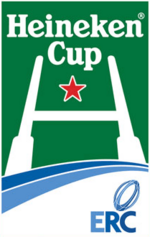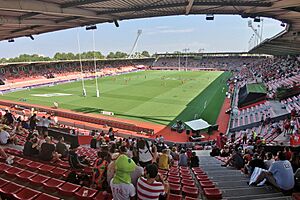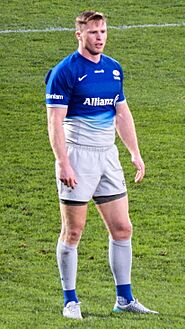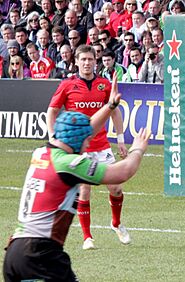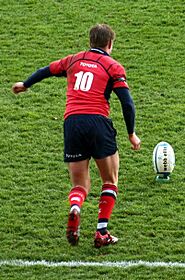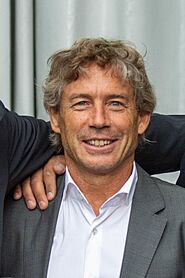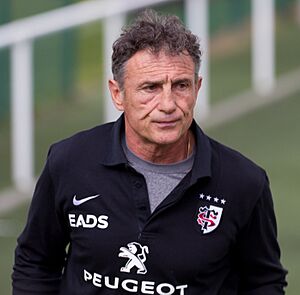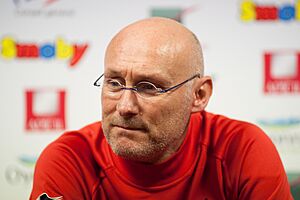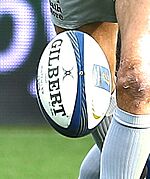European Rugby Champions Cup facts for kids
| Current season or competition: |
|
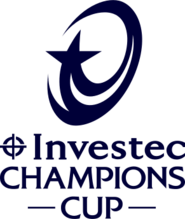 |
|
| Sport | Rugby union |
|---|---|
| Inaugural season | 1995–96 as Heineken Cup 2014–15 as Champions Cup |
| Chairman | Dominic McKay |
| Number of teams | 24 |
| Nations | |
| Holders | |
| Most titles | |
| Related competitions | European Rugby Challenge Cup (2nd tier) European Rugby Continental Shield |
The European Rugby Champions Cup (also called the Investec Champions Cup because of its sponsor) is a big annual rugby union tournament. It is organized by European Professional Club Rugby (EPCR). This competition is for the best rugby clubs in Europe. Teams get to play in the Champions Cup by finishing high in their national leagues. These leagues are the English Premiership, French Top 14, and United Rugby Championship. If a team wins the second-tier Challenge Cup, they also get a spot. Teams that do not qualify for the Champions Cup can play in the Challenge Cup.
From 1995 to 2014, this tournament was known as the Heineken Cup. It was run by a different group called European Rugby Cup. Later, there were some disagreements about how the competition should be run. So, EPCR took over, and the name changed to the European Rugby Champions Cup. Heineken became a sponsor again in the 2018–19 season. This led to the name "Heineken Champions Cup." Even though they were run by different groups, both versions of the tournament are seen as one long chain of European club championships. Teams that won multiple times have their wins from both versions counted together.
French clubs have won the most titles, with 13 victories. English clubs are next with 10 wins, and Irish clubs have 7 wins. England has had the most different winning teams, with six clubs taking the title. Thirteen different clubs have won the competition. Eight of these clubs have won it more than once. Five teams have won the title two years in a row. Toulon even won it three times in a row from 2012–13 to 2014–15. Toulouse is the most successful club, winning 6 times. They won the very first season in 1995–96. Bordeaux are the current champions. They beat Northampton Saints 28–20 in the 2025 final in Cardiff, Wales. Toulouse has won both the European Cup and their national championship three times. This is a record in Europe.
Contents
Tournament History
Heineken Cup Era (1995–2014)
Early Years (1995–1999)
The Heineken Cup started in the summer of 1995. It was created by the Five Nations Committee to have a new professional competition between countries. Twelve teams from Ireland, Wales, Italy, Romania, and France played in the first tournament. English and Scottish teams did not join at first. The first game was in Romania, where Toulouse beat Farul Constanţa 54–10. Toulouse became the first European champions. They beat Cardiff in extra time in front of 21,800 fans.
Clubs from England and Scotland joined in 1996–97. The competition grew to 20 teams. Brive beat Leicester Tigers 28–9 in the final. About 35 million people watched this match on TV. In 1997–98, teams started playing each other home and away in the group stages. This meant each team played at least six games. Bath won the final against Brive. English clubs then decided to leave the competition for a short time.
Without English clubs, the 1998–99 tournament had teams from France, Italy, Ireland, Scotland, and Wales. Ulster won the trophy. They beat Colomiers 21–6 in front of 49,000 fans in Dublin.
Growing Popularity (1999–2004)
English clubs returned in 1999–00. The group games were spread out over three months. This allowed the competition to fit better with national leagues. For the first time, clubs from four nations reached the semi-finals. Northampton Saints won their first major title. They beat Munster by just one point in the final.
In 2000–01, Leicester Tigers won the final against Stade Français 34–30 in Paris. Leicester then became the first team to win the title two years in a row in 2001–02. They beat Munster in the final. From 2002, the winner of the European Challenge Cup automatically qualified for the Heineken Cup. Toulouse won their second title in 2003.
In 2003–04, Welsh teams changed how they played. Instead of club teams, they started sending regional teams to European competitions. London Wasps won their first Heineken Cup. They beat defending champions Toulouse 27–20 in a thrilling final. Many people called it one of the best finals ever.
Later Years (2005–2014)
In 2005, Toulouse won their third Heineken Cup title. They became the first team to do so. In 2006, Munster finally won the cup. They had been close many times before. They beat Biarritz 23–19 in Cardiff.
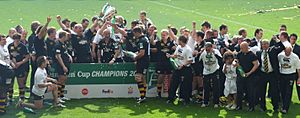
The 2006–07 season saw London Wasps win their second title. They beat Leicester Tigers 25–9 in front of a record crowd of 81,076 fans. There was some worry about the tournament's future after this season. French clubs said they might not play because of too many games. But, a meeting confirmed that all six nations' top teams would continue to play.
In 2008, Munster won their second cup. They beat Toulouse in Cardiff. Leinster won their first title in 2009. They beat Leicester Tigers in the final. This season also had a record attendance for a club rugby match. Over 82,000 fans watched Leinster play Munster in the semi-final.
In 2010, Toulouse won their fourth title, a new record. In 2011, Leinster won their second title. They made an amazing comeback in the final against Northampton Saints. They were losing 22–6 at halftime but scored 27 points without reply to win 33–22. Johnny Sexton scored 28 of Leinster's points.
Leinster won again in 2012, beating Ulster 42–14. They became the second team to win back-to-back titles. They were also the only team to win three championships in four years. The 2012 final set several records, including the highest attendance for a final (81,774). The last Heineken Cup tournament was in 2014. Toulon won it for the second time.
Champions Cup Era (2014–Present)
New Beginnings (2014–2018)
The tournament started as the Champions Cup on October 17, 2014. Toulon won again, beating Clermont 24–18. They became the first club to win three European titles in a row.
Saracens won their first title in 2016, beating Racing 92 21–9. They won again in 2017, defeating Clermont 28–17. In 2017–18, Leinster won their fourth European title. They beat Racing 92 15–12 in the final. Leinster also won their domestic league, achieving a "Double" title.
Heineken Champions Cup (2018–2023)
Saracens won the 2018–19 competition. They beat Leinster 20–10 in the final. During this time, there were some issues with Saracens breaking rules about player payments in their domestic league. However, the European rugby organizers confirmed that this did not change their European titles.
Because of the COVID-19 pandemic, the 2020–21 competition had a different format. Teams were split into two large groups. The top teams from each group moved to a knockout stage. The 2021–22 and 2022–23 seasons also used similar changed formats.
Investec Champions Cup (2023–Present)
On August 31, 2023, Investec became the main sponsor. The tournament went back to a more traditional group stage format. There are now four groups of six teams. The top four teams from each group move on to the knockout rounds. The fifth-placed team in each group goes into the Challenge Cup. The last-placed team is out. The knockout rounds are single games. The higher-ranked team usually gets to play at home for the earlier knockout games. The semi-finals are played at a neutral venue in the higher-ranked team's country. The final is held in a big stadium chosen beforehand.
Finals Overview
Twickenham Stadium in London has hosted the final six times, more than any other venue. The Millennium Stadium in Cardiff has hosted five finals. Its older version, the National Stadium, hosted two more. So, the site in Cardiff has hosted the most finals overall (seven). The 2018 final was held in Bilbao, Spain, which is not part of the main competing nations. As of 2025, the final has never been held in South Africa or Italy. Nigel Owens from Wales has refereed the most finals, with seven.
| Match was won during extra time |
| Heineken Cup era | ||||||
|---|---|---|---|---|---|---|
| Season | Winners | Score | Runners-up | Venue | Att | Referee |
| 1995–96 | 21–18 |
21,800 | ||||
| 1996–97 | 28–9 | 41,664 | ||||
| 1997–98 | 19–18 | 36,500 | ||||
| 1998–99 | 21–6 | 49,000 | ||||
| 1999–00 | 9–8 | 68,441 | ||||
| 2000–01 | 34–30 | 44,000 | ||||
| 2001–02 | 15–9 | 74,600 | ||||
| 2002–03 | 22–17 | 28,600 | ||||
| 2003–04 | 27–20 | 73,057 | ||||
| 2004–05 | 18–12 |
51,326 | ||||
| 2005–06 | 23–19 | 74,534 | ||||
| 2006–07 | 25–9 | 81,076 | ||||
| 2007–08 | 16–13 | 74,500 | ||||
| 2008–09 | 19–16 | 66,523 | ||||
| 2009–10 | 21–19 | 78,962 | ||||
| 2010–11 | 33–22 | 72,456 | ||||
| 2011–12 | 42–14 | 81,774 | ||||
| 2012–13 | 16–15 | 50,198 | ||||
| 2013–14 | 23–6 | 67,586 | ||||
| Champions Cup era | ||||||
| 2014–15 | 24–18 | 56,622 | ||||
| 2015–16 | 21–9 | 58,017 | ||||
| 2016–17 | 28–17 | 55,272 | ||||
| 2017–18 | 15–12 | 52,282 | ||||
| 2018–19 | 20–10 | 51,930 | ||||
| 2019–20 | 31–27 | 0 | ||||
| 2020–21 | 22–17 | 10,000 | ||||
| 2021–22 | 24–21 | 59,682 | ||||
| 2022–23 | 27–26 | 51,711 | ||||
| 2023–24 | 31–22 |
61,531 | ||||
| 2024–25 | 28–20 | 70,225 | ||||
Finals by Club
| Club | Champions | Runners-up | Years as champions | Years as runners-up |
|---|---|---|---|---|
| 6 | 2 | 1995–96, 2002–03, 2004–05, 2009–10, 2020–21, 2023–24 | 2003–04, 2007–08 | |
| 4 | 4 | 2008–09, 2010–11, 2011–12, 2017–18 | 2018–19, 2021–22, 2022–23, 2023–24 | |
| 3 | 1 | 2015–16, 2016–17, 2018–19 | 2013–14 | |
| 3 | 0 | 2012–13, 2013–14, 2014–15 | — | |
| 2 | 3 | 2000–01, 2001–02 | 1996–97, 2006–07, 2008–09 | |
| 2 | 2 | 2005–06, 2007–08 | 1999–00, 2001–02 | |
| 2 | 1 | 2021–22, 2022–23 | 2020–21 | |
| 2 | 0 | 2003–04, 2006–07 | — | |
| 1 | 2 | 1999–00 | 2010–11, 2024–25 | |
| 1 | 1 | 1996–97 | 1997–98 | |
| 1 | 1 | 1998–99 | 2011–12 | |
| 1 | 0 | 1997–98 | — | |
| 1 | 0 | 2019–20 | — | |
| 1 | 0 | 2024–25 | — | |
| 0 | 3 | — | 2012–13, 2014–15, 2016–17 | |
| 0 | 3 | — | 2015–16, 2017–18, 2019–20 | |
| 0 | 2 | — | 2000–01, 2004–05 | |
| 0 | 2 | — | 2005–06, 2009–10 | |
| 0 | 1 | — | 1995–96 | |
| 0 | 1 | — | 1998–99 | |
| 0 | 1 | — | 2002–03 |
Wins by Nation
| Nation | Winners | Runners-up |
|---|---|---|
| 13 | 16 | |
| 10 | 6 | |
| 7 | 7 | |
| 0 | 1 | |
| 0 | 0 | |
| 0 | 0 | |
| 0 | 0 |
Player Records
These tables show some of the top players in the tournament's history.
Career Records
Up to date as of July 23, 2025
Most Tries
| Rank | Player | Club(s) | Games played | Tries | Try Ratio |
|---|---|---|---|---|---|
| 1 | Northampton Saints, Saracens, Toulon, Sale Sharks, Leicester Tigers | 70 | 41 | 0.59 | |
| 2 | Toulouse | 83 | 36 | 0.43 | |
| 3 | Munster, Racing | 68 | 35 | 0.51 | |
| 4 | Leinster | 87 | 33 | 0.38 | |
| Racing 92 | 63 | 0.52 | |||
| 6 | Leinster | 39 | 31 | 0.79 | |
| 7 | Ulster, Ospreys | 66 | 29 | 0.44 | |
| Pontypridd, Llanelli, Bridgend, Celtic Warriors, Harlequins, Scarlets | 60 | 0.48 | |||
| 9 | Ulster | 71 | 27 | 0.38 | |
| Leinster | 87 | 0.31 | |||
| Castres, Toulouse | 51 | 0.53 | |||
| Clermont, Bordeaux | 33 | 0.82 | |||
| 13 | Leinster | 104 | 26 | 0.25 | |
| 14 | Leicester Tigers | 74 | 25 | 0.34 | |
| Clermont | 37 | 0.68 |
- Players in BOLD are still playing for a team in the EPCR competition.
Most Points
| Rank | Player | Club(s) | Points |
|---|---|---|---|
| 1 | Munster | 1,365 | |
| 2 | Saracens | 874 | |
| 3 | Llanelli, Clermont Auvergne, Scarlets | 869 | |
| 4 | Leinster, Racing Métro 92 | 784 | |
| 5 | Biarritz | 661 | |
| 6 | Milan, Stade Français | 645 | |
| 7 | Ospreys, Northampton Saints, Toulon | 634 | |
| 8 | Bourgoin, Clermont Auvergne | 569 | |
| 9 | Ulster | 564 | |
| 10 | Cardiff Blues, Toulon, Scarlets, Harlequins | 523 |
- Players in BOLD are still playing for a team in the EPCR competition.
Most Goals (Penalties and Conversions)
| Rank | Player | Club(s) | Goals |
|---|---|---|---|
| 1 | Munster | 488 | |
| 2 | Saracens, Racing Métro 92 | 352 | |
| 3 | Llanelli, Clermont Auvergne, Scarlets | 313 | |
| 4 | Leinster, Racing Métro 92 | 294 | |
| 5 | Biarritz | 235 | |
| 6 | Milan, Stade Français | 231 | |
| 7 | Ospreys, Northampton Saints, Toulon | 223 | |
| 8 | Clermont, Bourgoin | 220 | |
| 9 | Cardiff Blues, Toulon, Scarlets, Harlequins | 176 | |
| Pontypridd, Cardiff RFC, Celtic Warriors | 176 |
- Players in BOLD are still playing for a team in the EPCR competition.
Most Appearances
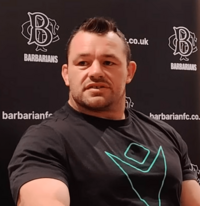
| Rank | Player | Club(s) | Games |
|---|---|---|---|
| 1 | Leinster | 114 | |
| 2 | Munster | 110 | |
| 3 | Leinster | 104 | |
| 4 | Munster | 101 | |
| Munster, Saracens, Bath, Sale | 101 | ||
| 6 | Sale Sharks, Saracens | 99 | |
| 7 | Munster | 97 | |
| 8 | Toulouse | 96 | |
| 9 | Leinster, Leicester Tigers | 92 | |
| 10 | Stade Francais, Leicester Tigers, Castres Olympique, ASM Clermont Auvergne | 90 |
- Players in BOLD are still playing for a team in the EPCR competition.
Most Titles Won by a Player
Up to date as of July 23, 2025
| Rank | Titles Won | Player | Club(s) | Years Won |
|---|---|---|---|---|
| 1 | 6 | Toulouse (3) Toulon (3) |
2003 2005 2010 2013 2014* 2015* |
|
| 2 | 4 | Brive (1) Toulouse (3) |
1997 2003 2005 2010 |
|
| Leinster (4) | 2009 2011 2012 2018 |
|||
| Leinster (4) | 2009 2011 2012 2018 |
|||
| Leinster (4) | 2009 2011 2012 2018 |
|||
| Saracens (2) La Rochelle (2) |
2017 2019 2022 2023 |
|||
| Leinster (4) | 2009 2011 2012 2018 |
|||
| 8 | 3 | La Rochelle (1) Toulouse (1) Bordeaux (1) |
2022 2024 2025 |
|
| *Titles include any season where a player played in the tournament, even if they did not play in the final. | ||||
- Players in BOLD are still playing for a team in the EPCR competition.
Single Season Records
Single season records up to date as of July 23, 2025
Most Tries in a Season
| Rank | Player | Club | Season | Tries | Games played | Ratio |
|---|---|---|---|---|---|---|
| 1 | Bordeaux Bègles | 2024–25 | 14 | 8 | 1.75 | |
| 2 | Saracens | 2013–14 | 11 | 9 | 1.22 | |
| 3 | Brive | 1996–97 | 10 | 7 | 1.43 | |
| Leinster | 2021–22 | |||||
| 5 | Swansea | 2000–01 | 9 | 7 | 1.29 | |
| Northampton Saints | 2024–25 | 8 | 1.13 | |||
| 7 | Bordeaux Bègles | 2024–25 | 8 | 6 | 1.33 | |
| Toulouse | 2011–12 | |||||
| Leinster | 2004–05 | 7 | 1.14 | |||
| Exeter Chiefs | 2019–20 | 8 | 1 | |||
| Clermont | 2012–13 | 9 | 0.89 |
Most Points in a Season
| Rank | Player | Club | Season | Points |
|---|---|---|---|---|
| 1 | Stade Français | 2000–01 | 188 | |
| 2 | Leicester Tigers | 2000–01 | 152 | |
| 3 | Ulster | 1998–99 | 144 | |
| 4 | Leinster | 2010–11 | 138 | |
| 5 | Cardiff | 1997–98 | 134 | |
| 6 | Munster | 1999–00 | 131 | |
| 7 | Bath | 1997–98 | 129 | |
| Leinster | 2005–06 | |||
| Munster | 2001–02 | |||
| 10 | Munster | 2000–01 | 127 | |
| Saracens | 2015–16 |
European Player of the Year
The European Player of the Year award started in 2010. Ronan O'Gara was the first winner. The award was later renamed the Anthony Foley Memorial Award. This was to honor Munster Head Coach Anthony Foley after he passed away.
| Year | Player | Club | Reference |
|---|---|---|---|
| 2010 | |||
| 2011 | |||
| 2012 | |||
| 2013 | |||
| 2014 | |||
| 2015 | |||
| 2016 | |||
| 2017 | |||
| 2018 | |||
| 2019 | |||
| 2020 | |||
| 2021 | |||
| 2022 | |||
| 2023 | |||
| 2024 | |||
| 2025 |
Title-Winning Coaches
| No. of wins | Coach | Club(s) |
|---|---|---|
| 4 | ||
| 3 | ||
| 2 | ||
| 1 | ||
Sponsors and Equipment
Sponsors
When the Champions Cup was created, the old organizers were criticized for not making enough money from the Heineken Cup. The new organizers, EPCR, wanted to have several main sponsors. However, only Heineken signed on at first.
Main Partners
- Heineken (1995–2014; 2018–): Heineken was the first sponsor of the Champions Cup. They returned as the main sponsor in 2018, and the tournament was renamed the "Heineken Champions Cup." In France, it is called the "H Cup" due to rules about alcohol advertising.
- Turkish Airlines (2015–2017): This airline was announced as a main partner for three seasons.
Equipment Suppliers
- Webb Ellis – Provided match balls and officials' kit (2003–2009).
- Adidas – Provided match balls and officials' kit (2009–2014).
- Canterbury of New Zealand – Provided match officials' kit (2014–2016).
- Gilbert – Provides match balls (1998–2002; 2014–) and officials' kit (2016–2019).
- Kappa – Provides match officials' kit (2019–).
- Tissot – Official watch and timekeeper (2015–). Tissot also sponsors the match officials' kit.
- DHL – Official logistics partner (2021–). At all matches, the game ball is brought out on a special DHL stand.
The Trophy
The European Rugby Champions Cup trophy was shown for the first time in October 2014. It was made by Thomas Lyte. The trophy is made of different metals, including silver and 18-carat gold. The design looks like a star from above. This represents European rugby, including the 19 seasons of the old Heineken Cup.
The trophy weighs 13.5 kg and has five handles. The top looks like a crown, showing that the winners are "Kings of Europe." The bottom of the trophy has the badges of the 10 clubs that won the Heineken Cup. This connects the old and new European competitions.
Media Coverage
The Champions Cup games are shown on TV and radio around the world.
| Territory | Rights holder |
|---|---|
| Austria | More Than Sports |
| Baltic states | Viaplay |
| France |
|
| Georgia | Rugby TV |
| Germany | More Than Sports |
| Ireland |
|
| Italy |
|
| Malta | GO |
| Netherlands | Viaplay |
| Nordic countries | Viaplay |
| Poland | Polsat |
| Portugal | SportTV |
| Romania | Digi |
| Spain | Movistar |
| Switzerland | More Than Sports |
| United Kingdom | |
| Other territories |
| Territory | Rights holder |
|---|---|
| Australia | beIN Sports |
| Canada | FloSports |
| Caribbean | SportsMax |
| Latin America (including Brazil) | ESPN |
| New Zealand | Sky |
| Pacific Islands | Digicel |
| Southeast Asia | Premier Sports |
| Sub-Saharan Africa (including South Africa) | SuperSport |
| United States | FloSports |
| Other territories |
Radio partnerships:
- BBC Radio (United Kingdom)
- RTÉ Radio (Ireland)
- Off The Ball/Newstalk (Ireland)
For other places without official TV channels, games can be watched on EPCR's website, epcrugby.tv.
Attendance Records
This section shows how many people have attended the European Cup games each season. The final usually has the most fans because it is held in a very large stadium.
The 2009 semi-final between Leinster and Munster had 82,208 fans. This set a world record for a club rugby match at the time. Another big game was a pool match in 2009 between Stade Français and Harlequins. It drew 76,569 fans to Stade de France in Paris. In 2011, a quarter-final game between Perpignan and Toulon was held in Barcelona, Spain. It had a sold-out crowd of 55,000.
| Season | Total | Average | Highest | ||
|---|---|---|---|---|---|
| 1995–96 | 97,535 | 6,502 | 21,800 | ||
| 1996–97 | 317,987 | 6,765 | 41,664 | ||
| 1997–98 | 462,958 | 6,613 | 36,500 | ||
| 1998–99 | 322,340 | 5,860 | 49,000 | ||
| 1999–00 | 626,065 | 7,924 | 68,441 | ||
| 2000–01 | 646,834 | 8,187 | 44,000 | ||
| 2001–02 | 656,382 | 8,308 | 74,600 | ||
| 2002–03 | 704,782 | 8,921 | 46,000 | ||
| 2003–04 | 817,833 | 10,352 | 73,057 | ||
| 2004–05 | 918,039 | 11,620 | 51,326 | ||
| 2005–06 | 964,863 | 12,370 | 74,534 | ||
| 2006–07 | 914,048 | 11,570 | 81,076 | ||
| 2007–08 | 942,373 | 11,928 | 74,417 | ||
| 2008–09 | 1,177,064 | 14,900 | 82,208 | ||
| 2009–10 | 1,080,598 | 13,678 | 78,962 | ||
| 2010–11 | 1,139,427 | 14,423 | 72,456 | ||
| 2011–12 | 1,172,127 | 14,837 | 81,774 | ||
| 2012–13 | 1,063,218 | 13,458 | 50,148 | ||
| 2013–14 | 1,127,926 | 14,278 | 67,578 | ||
| 2014–15 | 985,717 | 14,712 | 56,622 | ||
| 2015–16 | 955,647 | 14,263 | 58,017 | ||
| 2016–17 | 1,018,026 | 15,194 | 55,272 | ||
| 2017–18 | 1,005,537 | 15,008 | 52,282 | ||
| 2018–19 | 1,020,286 | 15,228 | 51,930 | ||
| 2019–20* | 779,079 | 12,985 | 42,041 | ||
| 2020–21* | – | – | 10,000 | ||
| 2021–22* | 843,371 | 14,056 | 59,682 | ||
| 2022–23 | 1,028,422 | 16,324 | 51,711 | ||
| 2023–24 | 1,160,390 | 18,419 | 82,300 | ||
| 2024–25 | 1,142,553 | 18,428 | 70,225 | ||
| *Means that rules about how many people could attend were in place due to the COVID-19 pandemic. | |||||
See also
 In Spanish: Copa de Campeones Europeos de Rugby para niños
In Spanish: Copa de Campeones Europeos de Rugby para niños
- List of European Rugby Champions Cup finals
- European Rugby Challenge Cup (Second-tier competition)
- Rugby Europe Super Cup (Third-tier competition)
- Premiership (England's top league)
- United Rugby Championship (League for teams from Ireland, Italy, Scotland, South Africa, and Wales)
- Top 14 (France's top league)
- Club World Cup
 | Isaac Myers |
 | D. Hamilton Jackson |
 | A. Philip Randolph |


